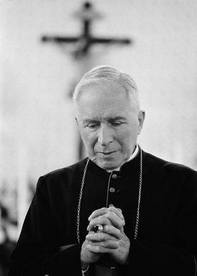
CONSUBSTANTIAL WITH THE FATHER
We must love to think over the whole life of our Lord in order better to grasp the great mystery which is our Lord and which unites in Him the three grand mysteries of the Trinity, the Incarnation, and the Redemption. The Creed is a nourishing spiritual food. There is no need to look for a difficult and complicated topic for our meditation; the Creed offers us a very fruitful one, and initiates us into the great mysteries which are to be our consolation here below and our joy in heaven.
The Symbol of Nicea is even more explicit:
I believe in one God, the Father almighty, Maker of heaven and earth, and of all things, visible and invisible. And in one Lord Jesus Christ, the only begotten Son of God. And born of the Father, before all ages. God of God: Light of Light: true God of true God. Begotten, not made, consubstantial with the Father...
Here it is a question of the Divine nature of Our Lord, by whom all things were made.
Then comes His Incarnation:
Who, for us men, and for our salvation, came down from heaven. And became incarnate by the Holy Ghost of the Virgin Mary: and was made man. He was crucified also for us, suffered under Pontius Pilate, and was buried. And the third day He rose again according to the Scriptures. And ascended into heaven, and sitteth at the right hand of the Father. And he shall come again with glory to judge both the living and the dead, of whose kingdom there shall be no end....
All the clauses of these sentences take on considerable importance. The Credo is short, quickly read or recited, but it is the very thing that men should know and meditate all their life long. After all, knowing what God has done for us is the most essential thing.
It is clearly affirmed that God is the Creator of all things: our Lord who is God is our Creator. He is the Word of God by whom all was made, hence He is both our Beginning and our End. He desired to make Himself our way which leads to the end; and not only our way, but also our nourishment, and also to be our brother and to communicate to us the divine life. It is an admirable history. Our Lord is the measure of the worth of persons and things. To the degree that the one and the other are nearer our Lord they have real worth, true worth. Clearly, then, it is the most Blessed Virgin and St. Joseph who hold the first places.
In spirituality, there is a tendency to minimize the place and the role of St. Joseph; yet he held an extraordinary place in the economy of the Incarnation and the Redemption. To him were confided the Mother of Jesus, and Jesus himself, thus God Himself. He certainly received very special graces of light on the mystery of the Incarnation.
In the measure that men are close to Our Lord, they become transformed in our Lord, they live in our Lord. This is seen in the history of the Church: it is around our Lord that families, communities, villages and towns are constituted. Literally, all live around our Lord. Even professional associations had their patron saints and feastdays within the profession, within society. In the family, the entire atmosphere was imbued with the presence of our Lord. We must try to restore this ambiance, and introduce the presence of our Lord once again into our daily lives, and His royalty into the course of everyday public life. We must become truly Christian once again.
We must dwell upon the mystery of our Lord Jesus Christ, and believe in His Divinity, for He is God.
The Nicene Creed continues:
I believe in the Holy Spirit, the Lord, the giver of life, who proceeds from the Father and the Son. Together with the Father and the Son he is adored and glorified; he it was who spoke through the prophets.
I believe in one, holy, catholic, and apostolic church. I profess one baptism for the remission of sins. And I look forward to the resurrection of the dead, and the life of the world to come. Amen.
Notice that the Symbol of Nicea begins with this sentence: "I believe in one God"; hence, there are not several Gods. When the highest authority of the Church and the bishops go so far as to say: "We have the same God," in speaking of the Moslems, it is incredible. For they do not believe in the Blessed Trinity, and they do not have the same Faith as we do. The god they adore will give them, so they think, a hundredfold of the material goods they enjoy on earth. The richer one is, the richer one will be; the more concubines one has, the more one "will have in the figment they paint for themselves of heaven....Such is the god of the Moslems, whom we are told is He whom we adore!
Such statements are senseless and blasphemous.




